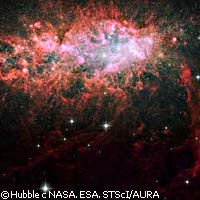International Year of Astronomy 2009 gets underway
The International Year of Astronomy (IYA2009) has been officially launched at a ceremony in Paris, France. Over the next 12 months, people around the world will have the opportunity to gaze at the stars, learn about the universe and find out about some of the latest discoveries in astronomy. The theme of the year is 'The Universe: yours to discover'. The Year is organised jointly by the International Astronomical Union (IAU) and the United Nations Educational, Scientific and Cultural Organisation (UNESCO). 'Over time, it has largely been astronomers and astrophysicists who have enjoyed the knowledge and understanding of the universe, its stars and planets, and their link to and impact on our daily life,' said UNESCO Director General Koichiro Matsuura at the opening ceremony. 'This Year provides us with a fantastic opportunity to expand this knowledge, and enable all people to explore the wonders of the universe and appreciate the benefits of its study for society.' Over 130 countries have signed up to participate in IYA2009, and thousands of events are planned at diverse locations across the globe. Some events will be organised in many countries at once. For example, the IYA2009 Solar Physics Group has arranged for amateur astronomers in over 30 countries to set up their telescopes on pavements and in science centres to give the general public the opportunity to look at the sun using special safety equipment. Elsewhere, the From Earth to the Universe exhibition will see large-scale astronomical images put on display in venues such as parks, art museums, shopping centres and underground stations. In April, the '100 hours of astronomy' initiative aims to encourage as many people as possible to look through a telescope, just like Galileo did 400 years ago. Online, the Cosmic Diary involves over 50 astronomers writing about their daily lives, their work and the challenges they face to enable the general public to see what astronomers' jobs are like and how research is carried out. Finally, the 'She is an astronomer' project provides a web platform that seeks to promote gender equality in astronomy and the other sciences. The IYA organisers are particularly keen to get children involved in astronomy, and the IAU and UNESCO are working together to developing high-quality educational and teaching materials in several languages. 'IYA2009 will reinforce the links between science education and science careers, stimulating a long-term increase in student enrolment in the fields of science and technology and an appreciation for lifelong learning,' said IAU President Catherine Cesarsky. Speaking at a recent event in the Czech Republic, EU Science and Research Commissioner Janez Potocnik highlighted Europe's contribution to astronomy: 'Europeans have been at the forefront of astronomical research for many years,' he commented. 'And they have been cooperating across borders for many years. These are exciting times for astronomical progress. There is a new generation of instruments so powerful that they really blow your mind! [...] They are dealing with and trying to answer some of the biggest questions of all, such as whether there is life on other planets, or how super massive black holes are formed.' Summing up the spirit of the year at the opening ceremony, Mr Matsuura said: 'People have always looked to the sky for answers to the questions 'how did we get here?' and 'why are we here?'. The sky belongs to everybody. Astronomy is an instrument to promote peace and understanding among nations and as such is at the heart of UNESCO's mission.'



